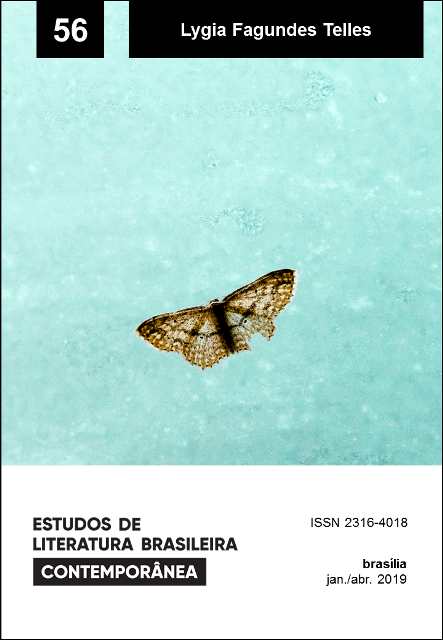A construção do outro nas edições e traduções da obra de Carolina Maria de Jesus
DOI:
https://doi.org/10.1590/2316-40185622Palavras-chave:
tradução, teoria pós-colonial, raça, história, Carolina Maria de JesusResumo
Este artigo investiga como as diferentes traduções e edições da obra da escritora afro-brasileira Carolina Maria de Jesus foram usadas para compor uma imagem específica do Brasil da década de 1960 para audiências estrangeiras. Nesse sentido, debate o poder da representação bem como de suas manipulações no processo de publicação sobre o qual certos autores têm capacidade de decisão limitada. Para tanto, comparo as estratégias de edição e tradução utilizadas em Quarto de despejo (1960) e na tradução feita por David St. Clair intitulada Child of the dark (1962) Ã s estratégias usadas em Meu estranho diário (1996) e The unedited diaries of Carolina Maria de Jesus (1998), traduzido por Nacy P.S. Naro e Cristina Mehrtens. Intersecções de gênero, raça e classe são vistas nesta análise como elementos-chave na projeção internacional de Carolina Maria de Jesus. Discuto tradução como um instrumento autorizando certas representações e endossando o alcance político de artefatos culturais.
Downloads
Referências
BASSNET, Susan; TRIVEDI, Harish (2002). Introduction: of colonies, cannibals and vernaculars. In: BASSNET, Susan; TRIVEDI, Harish (Org.). Post-colonial Translation: Theory and Practice. New York: Routledge.
ESTEVES, Lenita Maria Rimoli (2014). Atos de tradução: Éticas, intervenções, mediações. São Paulo: Humanitas.
FERRARO, Alceu Ravanello (2002). Analfabetismo e níveis de letramento no Brasil: O que dizem os censos?” Educação e Sociedade, Campinas, n. 23, v. 81, p. 21-47.
FERREIRA, Ana Paula (2009). Carolina in Black and White: Writing Race in Bondage. Philadelphia: MLA Convention.
FREYRE, Gilberto (2003). Casa Grande e Senzala: Formação da Família Brasileira sob o Regime da Economia Patriarcal. São Paulo: Global.
GUIMARÃES, Antonio Sérgio Alfredo (2001). Democracia Racial: O Ideal, o Pacto e o Mito. Novos Estudos ”“ CEBRAP, São Paulo, n. 61, p. 147-162, nov.
JAKOBSON, Roman (1987). On Linguistic Aspects of Translation (1933). In: POMORSKA, Krystina; RUDY, Stephen (Org.). Language in Literature: An Introduction to Stylistics. Cambridge, Mass.: Belknap P.
JESUS, Carolina Maria de (1961). Casa de alvenaria: diário de uma ex-favelada. Rio de Janeiro: Paulo de Azevedo.
JESUS, Carolina Maria de (1996). Meu estranho diário. Editado por Robert M. Levine, José Sebe Bom Meihy. São Paulo: Xamã.
JESUS, Carolina Maria de (1999). The unedited diaries of Carolina Maria de Jesus. Translated by Cristina Mehrtens and Nancy P. S. Naro. New Brunswick. New Jersey, London: Rutgers.
JESUS, Carolina Maria de (2003). Child of the dark. Translated by David St. Clair. New York: Dutton.
JESUS, Carolina Maria de (2007). Quarto de despejo: diário de uma favelada. São Paulo: Ática.
LEVINE, Robert M.; MEIHY, José Carlos Sebe Bom (1995). The life and death of Carolina Maria de Jesus. 1st ed. Albuquerque: University of New Mexico.
MOTTA, Rodrigo Patto Sá (2002). Em guarda contra o “perigo vermelho”: o anticomunismo no Brasil, 1917-1964. São Paulo: Editora Perspectiva, Fapesp.
NASCIMENTO, Abdias do (1978). O genocídio do negro brasileiro: processo de um racismo mascarado. Rio de Janeiro: Paz e Terra.
PERPÉTUA, Elzira Divina (2014). A vida escrita de Carolina Maria de Jesus. Belo Horizonte: Nandyala.
SANTOS, Zuleika Virgílio dos (2014). O desafio de Carolina Maria de Jesus: da invisibilidade à escritora de Quarto de despejo. Monografia (Licenciatura em Letras Português) ”“ Instituto de Letras, Universidade de Brasília, Brasília. Disponível em: http://bdm.unb.br/handle/10483/8712. Acesso em: 31/05/2017.
SPIVAK, Gayatri Chakravorty (1994). Can the subaltern speak? In: WILLIAMS, Patrick; CHRISMAN, Laura (Org.). Colonial Discourse and Post-Colonial Theory: A Reader. New York: Harvester /Wheatsheaf, p. 66-111.
VENUTI, Lawrence (2004). The Translator’s Invisibility: A History of Translation. London: Routledge.
Publicado
Como Citar
Edição
Seção
Licença
Autores que publicam nesta revista concordam com os seguintes termos:
a) Os(as) autores(as) mantêm os direitos autorais e concedem à revista o direito de primeira publicação, sendo o trabalho simultaneamente licenciado sob a Licença Creative Commons de Atribuição-Não Comercial 4.0, o que permite o compartilhamento do trabalho com reconhecimento da autoria do trabalho e publicação inicial nesta revista.
b) Os(as) autores(as) têm autorização para assumir contratos adicionais separadamente, para distribuição não-exclusiva da versão do trabalho publicada nesta revista (ex.: publicar em repositório institucional ou como capítulo de livro), com reconhecimento de autoria e publicação inicial nesta revista.
c) Autores têm permissão e são estimulados a publicar e distribuir seu trabalho on-line (ex.: em repositórios institucionais ou na sua página pessoal) após o processo editorial, já que isso pode gerar alterações produtivas, bem como aumentar o impacto e a citação do trabalho publicado (Veja O Efeito do Acesso Livre).
d) Os(as) autores(as) dos trabalhos aprovados autorizam a revista a, após a publicação, ceder seu conteúdo para reprodução em indexadores de conteúdo, bibliotecas virtuais e similares.
e) Os(as) autores(as) assumem que os textos submetidos à publicação são de sua criação original, responsabilizando-se inteiramente por seu conteúdo em caso de eventual impugnação por parte de terceiros.


